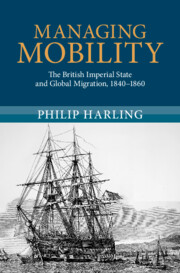Book contents
- Managing Mobility
- Reviews
- Modern British Histories
- Managing Mobility
- Copyright page
- Contents
- Acknowledgements
- Introduction
- 1 ‘An Awful Remedy’
- 2 ‘A Long Train of Moral Evils’
- 3 ‘The Most Perfect Skeletons I Ever Saw’
- 4 ‘A Stranger to the Facts Will Hardly Credit the Negligence’
- 5 ‘Not Altogether of a Hopeful Character’
- 6 ‘A New Epoch in the History of the Experiment’
- Conclusion
- Index
2 - ‘A Long Train of Moral Evils’
The End of Convict Transportation and the Rise of Assisted Emigration to Australia, c. 1837–1853
Published online by Cambridge University Press: 12 December 2024
- Managing Mobility
- Reviews
- Modern British Histories
- Managing Mobility
- Copyright page
- Contents
- Acknowledgements
- Introduction
- 1 ‘An Awful Remedy’
- 2 ‘A Long Train of Moral Evils’
- 3 ‘The Most Perfect Skeletons I Ever Saw’
- 4 ‘A Stranger to the Facts Will Hardly Credit the Negligence’
- 5 ‘Not Altogether of a Hopeful Character’
- 6 ‘A New Epoch in the History of the Experiment’
- Conclusion
- Index
Summary
Convict transportation and assisted ‘free’ immigration were both ambitious projects engineered by the British imperial state. Not just a mode of punishment, transportation was also a source of labour that was central to the British settlement of Australia. By the 1840s, however, too many Australian settlers had become convinced that transportation was a moral stain on New South Wales and Van Diemen’s Land that had to be wiped clean. The rise of free emigration in the 1830s that made transportation much less necessary as a source of labour was just as much a government enterprise, however. Colonial opinion frequently assailed British ‘government’ immigrants as too Irish, too poor, and ostensibly too unchaste. But the women and men thus recruited helped to provide a free labour force that ultimately made transportation expendable. They also helped ensure that Australia would preserve its status as a white settler colony by obviating the need for the mass importation of Asian-Pacific workers.
- Type
- Chapter
- Information
- Managing MobilityThe British Imperial State and Global Migration, 1840–1860, pp. 57 - 100Publisher: Cambridge University PressPrint publication year: 2024

